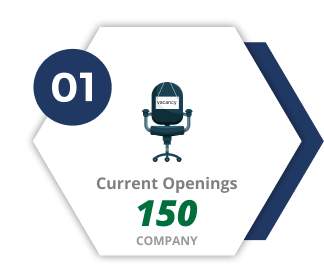Pay Only 75% Fee remaining 25% after Placement!
BECOME AN EXPERT IN ASIC VERIFICATION
ASIC verification is the process of testing and verifying a design before a complete system is manufactured. It is an important step in the semiconductor fabrication process, as it ensures that the design meets functional requirements and performance specifications.The verification process involves simulations, functional tests, logic checks, and other analysis to determine if the design of an integrated circuit (IC) is correct. A thorough verification also helps to identify any issues with timing or power consumption, which can be addressed before manufacturing begins.



Next Upcoming Training Batches

ELIGIBILITY
- Any year BTech, MTech, BE, ME pass out students
- with minimum of 50% in academics are eligible for.

Total fee: 60,000 + 18% GST =70,800/-
- Student need to pay 30,000+ 18%GST (5400) =35,400 in Training Period
- 10,000/- for registration immediately
- 10,000/- after the 1st month
- 10,000/- after the 2nd month
- 5,400/- after the 3rd month
- Remaining 35,400 + 18%GST(5400)=35,400 after getting placement (after receiving offer letter from company)

Course Curriculum
- Semiconductor ecosystem
- VLSI design cycle - front end design flow & backend design flow
- What is ASIC & FPGA
- FPGA design flow & ASIC design and verification flow
- SoC example and industry updates
- Opportunities for VLSI engineers in India
- VLSI industry work profiles and roles
- How to be industry ready?
- Digital system design & applications
- Introduction
- What is digital & analog
- Introduction to digital system design
- Elements of digital logic, number system
- Code conversion, logic gates, K-maps, Boolean algebra, SOP, POS
- BCD, excess-3, gray code, ASCII, complements
- Combinational logic design: adders, subtractors, multipliers, dividers, comparators, multiplexing, demultiplexing, encoders, decoders, parity, checkers, data path, control path, ALU
- Sequential logic design: synchronous logic design, asynchronous logic design
- Latches
- Flip-flops
- Counters (asynchronous, synchronous, mod, Johnson, ring)
- Registers (SISO, SIPO, PISO, PIPO, USR, LFSR)
- FSM (Mealy and Moore – overlapping and non-overlapping)
- FIFO (asynchronous, synchronous)
- Memories (RAM, ROM)
- Introduction & Importance of HDL - HDL vs High Level Languages.
- Basic Language elements
- Design Methodologies - Top Down, Bottom Up
- Verilog data types
- Verilog Modelling Styles:
- Dataflow Modelling – continuous assignment statements
- Gate Level Modelling/Structural modelling
- Behavioural Modelling – Procedural blocks, procedural block statements – blocking and non-blocking assignments.
- Switch Level Modelling – switch primitives
- System Tasks
- Logic Gates, Half Adder, Full Adder, Half subtractor, Full subtractor.
- Multiplexer – 2:1, 4:1, 8:1 and other mux-oriented problems.
- Logic gates using Mux, Encoder, Decoder, Priority Encoder
- Stratified Event Queue or Timing Regions In-depth explanation with examples.
- Comparator, Seven Segment, Multipliers
- Combinational Circuits to be taught in Behavioral (IF, CASE) and Gate level
- Adders – RCA, Carry Look ahead adder, ALU, Subtractor, Division Circuits
- Sequential Circuits:
- Latch – Definition, usage, types, Coding and Simulation Result Explanation.
- Flipflop – Types (dff, tff, jkff), Coding and Simulation Result Explanation, Sync and Async FF. Difference between Latch and Flipflop, Why Nonblocking should be used for Sequential Circuits?
- Counter - Both Synchronous and Asynchronous, Mod Counters, Repeated Counters, Ring, Johnson Counters.
- FSM – Melay and Moore, Timescale, Parameter, Local Param, ifdef
- Shift registers – SISO,PISO,PIPO,PISO, Bi-directional Registers, Universal Shift Registers
- MEMORIES – RAM, ROM, Frequency Dividers, Self-checking testbenches.
- Define, setup, hold time, Types of delays to be used in coding. – Inter,Intra,Gate
- Sequential and Parallel execution blocks, generate blocks, Primitives - Try
- Randomization based testbenches, Task oriented TB.
- Synthesizable vs Non-Synthesizable Constructs explanation with examples, Loops.
- Race conditions in Verilog with Live examples
- ASIC Verification:
- Introduction & Importance
- Verification Methodologies
- System Verilog: Introduction to Verification and System Verilog.
- Data Types:
- Integer, Void
- String, Event
- User-defined Enumerations
- Class Arrays
- Fixed Size Arrays - Packed and Un-Packed
- Dynamic Array - Associative Array, Queues, structure, Union, typedef
- Procedural Statements and Flow Control:
- always_ff, always_comb, Blocking & Non-Blocking assignments
- Unique-I, Priority-If
- While, do-while, for each & enhanced for loop
- Repeat, Forever
- Break & Continue
- Named Blocks and Statement Labels
- Disable block and disable statements
- Event Control.
- Tasks and Functions:
- Tasks
- Functions
- Argument passing – Automatic, Static
- Processes:
- fork-join
- fork-join any
- fork-join none
- wait-fork
- disable-fork
- Classes:
- Classes
- This Keyword
- Constructors
- Static Class Properties & Methods
- Class Assignment
- Shallow Copy & Deep Copy
- Parameterized Classes
- Inheritance
- Overriding Class Members
- Super Keyword
- Polymorphism, Casting
- Data Hiding and Encapsulation
- Abstract Classes & Virtual Methods
- Class Scope Resolution Operator
- Extern methods
- Type def Classes.
- Randomization & Constraints:
- Constraint Blocks
- External Constraint Blocks
- Inheritance
- Inside operator
- Weighted distribution
- Implication and if-else and other constructs.
- IPCSemaphore - Mailbox - Event:
- Scheduling Semantics
- Program Block
- Interface
- Mod port
- Clocking Blocks.
- Assertion:
- Assertions
- SVA Building Blocks
- SVA Sequence
- Implication Operator
- Repetition Operator
- SVA Built in Methods
- Ended and Disable iff.
- Coverage:
- Coverage
- Functional Coverage – Types
- Coverage Options - Parameters and define.
- Project on System Verilog on Industry Standard Protocol with assertions and coverage along with tool explanation.
-
INTRODUCTION
- What is UVM?
- Why UVM?
- Overview of UVM Structure.
-
UVM Testbench Architecture
- Test Bench Structure
- Explanation of Test Bench
- UVM Objects and UVM Components
- UVM Sequence Item
- UVM Sequence and UVM Sequencer
- UVM Driver and UVM Monitor
- UVM Agent and UVM Scoreboard
- UVM Test and UVM Top.
-
UVM Phases
- Types of Phases
- Explanation of Phases
UVM TLM
- Analysis Port
- Usage of TLM Ports
- Declaration and Connection of Ports
Register Layer
- Introduction
- Register Model
- Register Environment
- Connection of Register Environment
UVM Reporting
- Reporting Methods
- Configurations
- Usecases
UVM Configurations
- Usage of Configurations
- Set Config Methods
UVM Factory
- Registration
- Factory Methods Explanation
UVM Callback
- Body Call back
- Usage and Importance of Call Backs
Lock Grab
- Examples
- Arbitration
- Importance of Arbitration
- Usage of Arbitration
- Sequencer Arbitration
- Virtual Sequence, Sequencer
- Need and Usage of Virtual Sequence and Sequencer.
Sequential and Parallel Sequence, Layered Sequences
- Overview and Implementation of Sequences.
UVM MACROS
- Macros Explanation in UVM.
UVM Project
- UVC Development for Industry standard protocol.
- Explanation of IP, VIP, SOC Level Testbench flow, Testplans, Verification plan.
VLSI FIRST Vs OTHERS
| Key Considerations | VLSI First | Other INSTITUTE |
|---|---|---|
| Course Fee |
|
|
| Trainers |
|
|
| Placement |
|
|
| Class size |
|
|
| Course module |
|
|
| Projects |
|
|
| Locations |
|
|
| Assessment |
|
|
Why VLSI FIRST ?

Smaller class size - only 20 students per batch
VLSI Training with low student to teacher ratio has many advantages like one to one attention, students get an increased opportunity to bond with trainers, chance to trailer individual learning and less disruption.
Course Modules
We always listen to our students and Industry, and develop courses that meet the current demands of industry through a wide range of industry contacts and innovative teaching methods. These VLSI training modules are designed by our industry experts and are customized as per the requisites of the Semiconductor organizations


Exclusive, Experienced and Industry Professionals as Trainers
VLSI FIRST possesses a team of Exclusive trainers and industry professionals who have gained years of experience working on live project development and implementations. Their passion for study, learner-focused approach and their industry expertise gives learners an inspirational learning experience and an understanding of industry trends. Along with the exceptional academic faculties, our institute also possesses a strong team of administration staff, who ensure that your education sessions run smoothly and you get all the things that you need for VLSI Training conveniently.
Projects
RTL Design and Verification Training Projects are on Latest Industry Applications and Trends, Every student gets a different project, once student finishes his project before time then he can involve in other project, projects implementation helps understand VLSI technology and useful in getting placement.


Fee
Pay 25% fee after Placement, Quality Education at affordable price
Placement Assistance
Placement Training Starts from 1st day of Training and Placement Assistance will be valid upto 1 year after Training, for more details see placements page VLSI Training RTL Design and Verification Training


100% Placement Assistance
The Placement Cell of "VLSI FIRST" provides guidance and all the assistance to the students in order to achieve their career goals.
JOB ROLES
RTL Design Engineer
ASIC VERIFICATION Engineer
DV Engineer
Project Manager
Automotive Embedded
FPGA DESIGN Engineer
Test Engineer
Applications Engineer
PreSilicon and Post Silicon Validation Engineer
Frequently Asked Questions
Total fee: 1,00,000/- (+GST) Student need to pay 50,000 in Training Period
10000/- for Registration
10000/- after 1 st Month
10000/- after 2 nd Month
10000/- after 3 rd Month
10000/- after 4 th Month
Remaining 50,000 after getting placement (after receiving offer letter from company)
Total fee: 80,000/- (+GST) Student need to pay 40,000 in Training Period
10000/- for Registration
10000/- after 1st Month
10000/- after 2nd Month
10000/- after 3rd Month
Remaining 40,000 after getting placement (after receiving offer letter from company)
7pm to 8pm Lab session (we can change based on students availability between 6pm to 9pm for 1hr)
same timings from Monday to Friday, on Saturday we conduct Test and Sunday Holiday
1) Product Companies Ex: Intel, AMD, Qualcomm etc..
2) Service Companies Ex: Wipro, Capgemini, L&T etc...
For the total list of companies please go to our placement page.
Placement Process:
After 6 Months of Training, we provide 1 week of Placement training which includes your
- Resume preparation,
- Interview Questions Preparation,
- Technical Interview Preparation and
- HR Interview preparation.
MNC companies will be coming for 2months, we make sure that all the students get placed in MNC companies.
Those who are not successful in getting placement in MNC's will be attending start-ups for next 2 months.
If in worst case any student is not successful in getting placement in start-ups also, then we send them for internship in our company for next 3 months.
In internship students will be working directly on clients’ projects and will gain experience. Once students are done with internship then we take interview and based on students’ performance we give them 1 year of Internship experience as they have spent 1 year in institute (6 months for training + 2 months for MNC placements + 2 months for start-up placements + 3 months for internship = 12months)
Advantages if going as experienced candidate:
- More Opportunities – more openings in companies for experienced candidates
- Good Salary package
- Simple interview process (No written test and mostly 2 rounds of Interview)
- No bond and we can choose location of work.

ASIC Verification Training in India
Welcome to our premier ASIC Verification Training in India!
If you're looking for comprehensive ASIC Verification courses in India, you've come to the right place. Our ASIC Verification Institute in India offers top-notch training programs designed to equip you with the skills and knowledge needed for a successful career in ASIC Verification. Our ASIC Verification Training covers a wide range of topics, including verification methodologies, testbench development, coverage-driven verification, and more. With our experienced trainers and industry-leading curriculum, you'll gain a deep understanding of ASIC Verification concepts.
Our ASIC Verification certification in India is highly recognized in the industry and can significantly enhance your career prospects. Our rigorous training will prepare you to excel in ASIC Verification projects and advance in your job. Whether you prefer an in-person ASIC Verification bootcamp in India or online ASIC Verification classes in India, we have flexible options to suit your needs. Our ASIC Verification coaching in India is personalized and focused on your learning goals, ensuring that you get the most out of your training experience.
We understand that cost is an important consideration, which is why our ASIC Verification fees in India are competitive and offer excellent value for the quality of training you'll receive. Don't miss out on this opportunity to invest in your career with our ASIC Verification course in India. Upon successful completion of our ASIC Verification training, you'll be equipped with the skills and knowledge to land lucrative job opportunities in the field of ASIC Verification. Our placement assistance program will provide you with the support you need to kickstart your ASIC Verification career in India.
So why wait? Join our ASIC Verification Training in India today and take your career to new heights! Contact us to learn more about our ASIC Verification price in India and enroll in our next batch. With our top-rated training, you'll be well-prepared for a successful ASIC Verification career in India.









